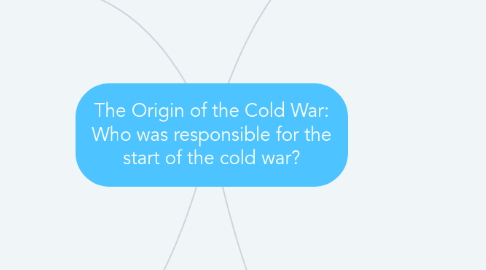The Origin of the Cold War: Who was responsible for the start of the cold war?
作者:Arti Nair


1. Arguments for holding Soviet Union responsible for the war.
1.1. The Truman Doctrine(1947) to "contain" communism. The US was skeptical of Soviet Union's communist regime, and concerned about Joseph Stalin tyrannical rule and the expansion of Soviet Union and communism in the Eastern part of the world. The US was worried that they might wipe out democracy around the world.
1.2. The bombing of the Bornholm by Soviet Union because the German leader in-charge wanted to align with the Western Alliance (US).
1.3. Soviet Union had known to aggressively deter countries in the Eastern bloc from accepting any assistance from the Marshall Plan.
1.4. Soviet Union defied the Yalta conference agreement and continued to annexe several countries in Easter Europe and bring them under a communist regime.
1.5. The Berlin Blockade was a deliberate attempt to block any aid supplied by the US to West Berlin, which was under Soviet Union occupation.
1.6. The "Long Telegram"
2. Arguments for holding both countries responsible
2.1. Soviet Union and US' ideologies were extremely different. Soviet Union was a communist country, while US was a capitalistic country. The friction caused by these varying ideologies already existed long before WWII. There was a lot of mistrust and doubt. This would have led to war anyway...one way or another.
2.2. The Iron Curtain speech given by Churchill is an indication of how the world had divided itself into two camps- the communist camp and the capitalistic camp and a war between them was unavoidable.
2.3. The two countries' idea of national security was dramatically different. The Soviet Union believed that space and expansion will offer them the security that they were looking for after WWII. Soviet Union was extremely cautious because they lost the most during the war. On the other hand, US' idea of security was about defining and creating international organisations that will maintain peace, and security.
3. Arguments for holding US responsible for the war.
3.1. Soviet Union was skeptical of another attack from Germany, and therefore, were trying to safeguard their position by expanded their regime into several eastern European countries. They seem to have a defensive rationale to the occupation of the Eastern Bloc. This defensive rationale can be justified if one were to consider the loss that Russia suffered during WWII.
3.2. US and UK took their time to enter the war front. USSR had asked the countries to start a second war front in 1941, but it was delayed till 1944. The Soviet Union resented the Americans for their late entry into WWII. They had lost a lot of people in the second world war, and they felt like the Americans took away all the credit for winning WWII despite joining the Allied forces at the end.
3.3. Even though US and Britain had to work together with the Soviet Union as the Allied forces in WWII, they were always skeptical of USSR, and held several secret meetings to make important decisions.
3.3.1. Right before the Postdam conference in 1945, the US and Britain were secretly working on the atomic bomb. The Soviet Union was intentionally kept away from these meetings.
3.3.2. US met with Nazi General Karl Wolff in northern Italy, and he was given immunity from the Nuremberg Trials. This was done secretly, and without the knowledge of the Soviet Union at first.
